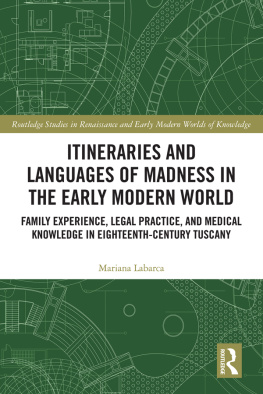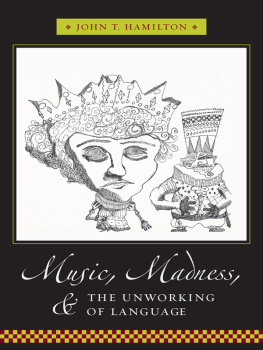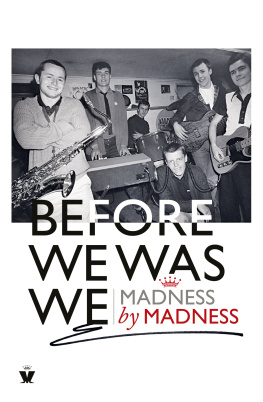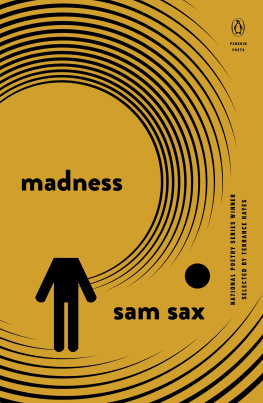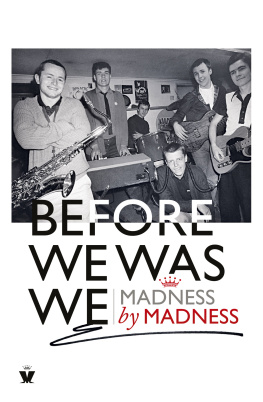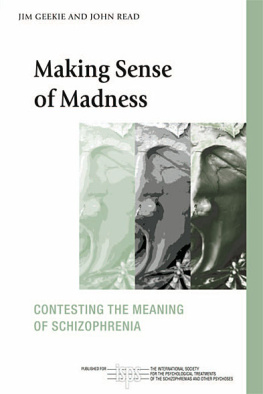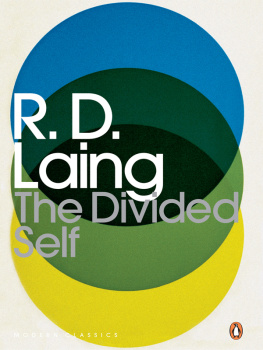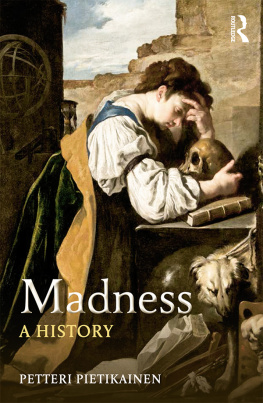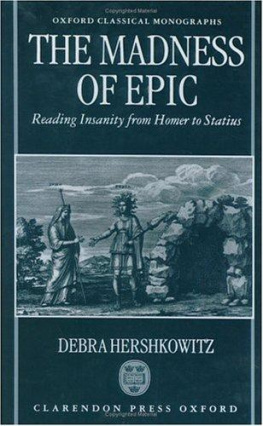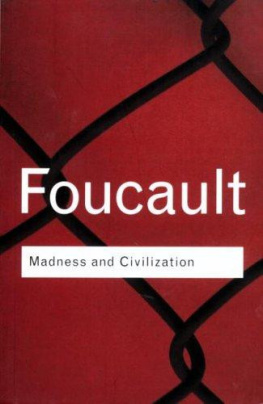Itineraries and Languages of Madness in the Early Modern World
Drawing on a wide range of sources, including interdiction procedures, records of criminal justice, documentation from mental hospitals, and medical literature, this book provides a comprehensive study of the spaces in which madness was recorded in Tuscany during the eighteenth century. It proposes the notion of itineraries of madness, which, intended as a heuristic device, enables us to examine records of madness across the different spaces where it was disclosed, casting light on the connections between how madness was understood and experienced, the language employed to describe it, and public and private responses devised to cope with it. Placing the emotional experience of the Tuscan families at the core of its analysis, this book stresses the central role of families in the shaping of new understandings of madness and how lay notions interacted with legal and medical knowledge. It argues that the perceptions of madness in the eighteenth century were closely connected to new cultural concerns regarding family relationships and family roles, which resulted in a shift in the meanings of and attitudes to mental disturbances.
Mariana Labarca is Assistant Professor at the History Department of the Universidad de Santiago de Chile.
Routledge Studies in Renaissance and Early Modern Worlds of Knowledge
Series Editors: Harald E. Braun
University of Liverpool, UK
Emily Michelson
University of St Andrews, UK
SRS Board Members:
Erik DeBom (KU Leuven, Belgium), Mordechai Feingold (California Institute of Technology, USA), Andrew Hadfield (Sussex), Peter Mack (University of Warwick, UK), Jennifer Richards (University of Newcastle, UK), Stefania Tutino (UCLA, USA), Richard Wistreich (Royal College of Music, UK)
This series explores Renaissance and Early Modern Worlds of Knowledge (c.1400 c.1700) in Europe, the Americas, Asia and Africa. The volumes published in this series study the individuals, communities and networks involved in making and communicating knowledge during the first age of globalization. Authors investigate the perceptions, practices and modes of behaviour which shaped Renaissance and Early Modern intellectual endeavour and examine the ways in which they reverberated in the political, cultural, social and economic sphere.
The series is interdisciplinary, comparative and global in its outlook. We welcome submissions from new as well as existing fields of Renaissance Studies, including the history of literature (including neo-Latin, European and non-European languages), science and medicine, religion, architecture, environmental and economic history, the history of the book, art history, intellectual history and the history of music. We are particularly interested in proposals that straddle disciplines and are innovative in terms of approach and methodology.
The series includes monographs, shorter works and edited collections of essays. The Society for Renaissance Studies (www.rensoc.org.uk) provides an expert editorial board, mentoring, extensive editing and support for contributors to the series, ensuring high standards of peer-reviewed scholarship. We welcome proposals from early career researchers as well as more established colleagues.
11 Euhemerism and Its Uses
The Mortal Gods
Edited by Syrithe Pugh
12 Itineraries and Languages of Madness in the Early Modern World
Family Experience, Legal Practice, and Medical Knowledge in Eighteenth-Century Tuscany
Mariana Labarca
For more information about this series, please visit: www.routledge.com/Routledge-Studies-in-Renaissance-and-Early-Modern-Worlds-of-Knowledge/book-series/ASHSER4043
First published 2021
by Routledge
2 Park Square, Milton Park, Abingdon, Oxon OX14 4RN
and by Routledge
605 Third Avenue, New York, NY 10158
Routledge is an imprint of the Taylor & Francis Group, an informa business
2021 Mariana Labarca
The right of Mariana Labarca to be identified as author of this work has been asserted by her in accordance with sections 77 and 78 of the Copyright, Designs and Patents Act 1988.
All rights reserved. No part of this book may be reprinted or reproduced or utilised in any form or by any electronic, mechanical, or other means, now known or hereafter invented, including photocopying and recording, or in any information storage or retrieval system, without permission in writing from the publishers.
Trademark notice: Product or corporate names may be trademarks or registered trademarks, and are used only for identification and explanation without intent to infringe.
British Library Cataloguing-in-Publication Data
A catalogue record for this book is available from the British Library
Library of Congress Cataloging-in-Publication Data
A catalog record for this book has been requested
ISBN: 978-0-367-52828-7 (hbk)
ISBN: 978-0-367-52829-4 (pbk)
ISBN: 978-1-003-05855-7 (ebk)
Typeset in Sabon
by Apex CoVantage, LLC
For Matilde
Contents
1 Interdiction procedures: a context for public intervention in family life
2 Mad spendthrift men: prodigality as a category of mental incapacity
3 Beyond financial mismanagement: interdictions by reason of demenza
4 Spaces and itineraries of madness
5 Experts and authorities on madness
6 Emotional disturbances and the circulation of the languages of madness
Conclusion
- 1 Interdiction procedures: a context for public intervention in family life
- 2 Mad spendthrift men: prodigality as a category of mental incapacity
- 3 Beyond financial mismanagement: interdictions by reason of demenza
- 4 Spaces and itineraries of madness
- 5 Experts and authorities on madness
- 6 Emotional disturbances and the circulation of the languages of madness
- Conclusion
Guide
1.1 Number of interdiction procedures recorded in the Magistrato dei Pupilli between 1690 and 1774 in blocks of 5 years
1.2 Distribution of the categories used in interdiction procedures between 1700 and 1774
1.1 Distribution of interdiction petitioners according to their blood relation with the defendant, 16881775
3.1 Categories of mental incapacity used in interdiction procedures between 1700 and 1775
5.1 Involvement of medical opinion in interdiction procedures between 1700 and 1775
| ASF | Archivio di Stato di Firenze |
| BNCF | Biblioteca Nazionale Centrale di Firenze |
| CR | Consiglio di Reggenza |
| GTT | Le carte di Giovanni Targioni Tozzetti |
| MPAAP | Magistrato dei Pupilli et Adulti avanti il Principato |
| MPAP | Magistrato dei Pupilli et Adulti del Principato |
| MS | Magistrato Supremo |
| SD | Ospedale di Santa Dorotea |
| OGB | Otto di Guardia e Bala |
| SMN | Santa Maria Nuova |
I owe an immense debt of gratitude to Giulia Calvi for her insightful comments, guidance, generosity, and dedication during the years of my Ph.D. at the European University Institute. I am also indebted to Bartolom Yun-Casalilla for his support and encouragement to transform my doctoral dissertation into a book. I am also very thankful to the examiners of my doctoral dissertation, Sandra Cavallo and John Henderson, for their valuable suggestions.

